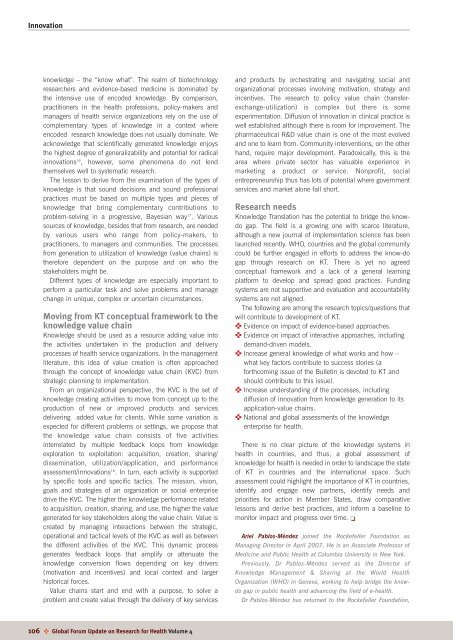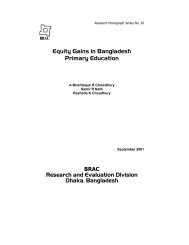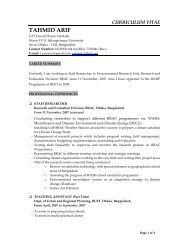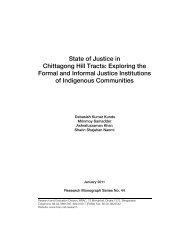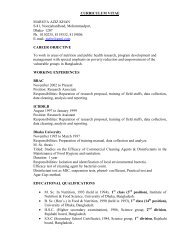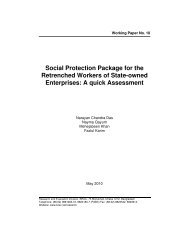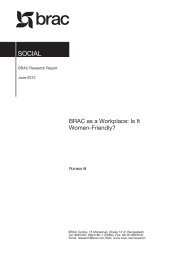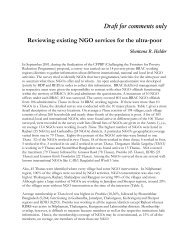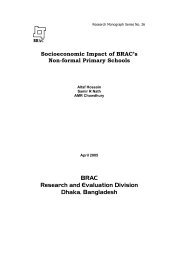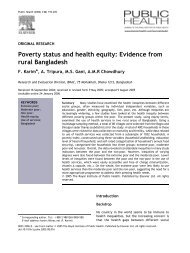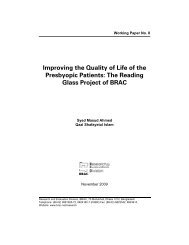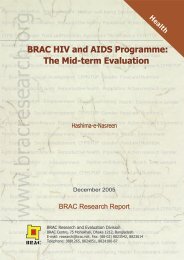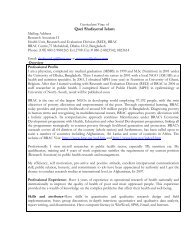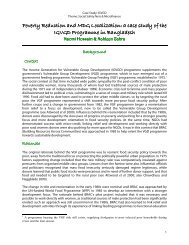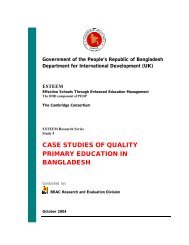Combining health and social protection measures to reach the ultra ...
Combining health and social protection measures to reach the ultra ...
Combining health and social protection measures to reach the ultra ...
You also want an ePaper? Increase the reach of your titles
YUMPU automatically turns print PDFs into web optimized ePapers that Google loves.
Innovation<br />
knowledge – <strong>the</strong> “know what”. The realm of biotechnology<br />
researchers <strong>and</strong> evidence-based medicine is dominated by<br />
<strong>the</strong> intensive use of encoded knowledge. By comparison,<br />
practitioners in <strong>the</strong> <strong>health</strong> professions, policy-makers <strong>and</strong><br />
managers of <strong>health</strong> service organizations rely on <strong>the</strong> use of<br />
complementary types of knowledge in a context where<br />
encoded research knowledge does not usually dominate. We<br />
acknowledge that scientifically generated knowledge enjoys<br />
<strong>the</strong> highest degree of generalizability <strong>and</strong> potential for radical<br />
innovations 16 , however, some phenomena do not lend<br />
<strong>the</strong>mselves well <strong>to</strong> systematic research.<br />
The lesson <strong>to</strong> derive from <strong>the</strong> examination of <strong>the</strong> types of<br />
knowledge is that sound decisions <strong>and</strong> sound professional<br />
practices must be based on multiple types <strong>and</strong> pieces of<br />
knowledge that bring complementary contributions <strong>to</strong><br />
problem-solving in a progressive, Bayesian way 17 . Various<br />
sources of knowledge, besides that from research, are needed<br />
by various users who range from policy-makers, <strong>to</strong><br />
practitioners, <strong>to</strong> managers <strong>and</strong> communities. The processes<br />
from generation <strong>to</strong> utilization of knowledge (value chains) is<br />
<strong>the</strong>refore dependent on <strong>the</strong> purpose <strong>and</strong> on who <strong>the</strong><br />
stakeholders might be.<br />
Different types of knowledge are especially important <strong>to</strong><br />
perform a particular task <strong>and</strong> solve problems <strong>and</strong> manage<br />
change in unique, complex or uncertain circumstances.<br />
Moving from KT conceptual framework <strong>to</strong> <strong>the</strong><br />
knowledge value chain<br />
Knowledge should be used as a resource adding value in<strong>to</strong><br />
<strong>the</strong> activities undertaken in <strong>the</strong> production <strong>and</strong> delivery<br />
processes of <strong>health</strong> service organizations. In <strong>the</strong> management<br />
literature, this idea of value creation is often approached<br />
through <strong>the</strong> concept of knowledge value chain (KVC) from<br />
strategic planning <strong>to</strong> implementation.<br />
From an organizational perspective, <strong>the</strong> KVC is <strong>the</strong> set of<br />
knowledge creating activities <strong>to</strong> move from concept up <strong>to</strong> <strong>the</strong><br />
production of new or improved products <strong>and</strong> services<br />
delivering added value for clients. While some variation is<br />
expected for different problems or settings, we propose that<br />
<strong>the</strong> knowledge value chain consists of five activities<br />
interrelated by multiple feedback loops from knowledge<br />
exploration <strong>to</strong> exploitation: acquisition, creation, sharing/<br />
dissemination, utilization/application, <strong>and</strong> performance<br />
assessment/innovations 18 . In turn, each activity is supported<br />
by specific <strong>to</strong>ols <strong>and</strong> specific tactics. The mission, vision,<br />
goals <strong>and</strong> strategies of an organization or <strong>social</strong> enterprise<br />
drive <strong>the</strong> KVC. The higher <strong>the</strong> knowledge performance related<br />
<strong>to</strong> acquisition, creation, sharing, <strong>and</strong> use, <strong>the</strong> higher <strong>the</strong> value<br />
generated for key stakeholders along <strong>the</strong> value chain. Value is<br />
created by managing interactions between <strong>the</strong> strategic,<br />
operational <strong>and</strong> tactical levels of <strong>the</strong> KVC as well as between<br />
<strong>the</strong> different activities of <strong>the</strong> KVC. This dynamic process<br />
generates feedback loops that amplify or attenuate <strong>the</strong><br />
knowledge conversion flows depending on key drivers<br />
(motivation <strong>and</strong> incentives) <strong>and</strong> local context <strong>and</strong> larger<br />
his<strong>to</strong>rical forces.<br />
Value chains start <strong>and</strong> end with a purpose, <strong>to</strong> solve a<br />
problem <strong>and</strong> create value through <strong>the</strong> delivery of key services<br />
<strong>and</strong> products by orchestrating <strong>and</strong> navigating <strong>social</strong> <strong>and</strong><br />
organizational processes involving motivation, strategy <strong>and</strong><br />
incentives. The research <strong>to</strong> policy value chain (transferexchange-utilization)<br />
is complex but <strong>the</strong>re is some<br />
experimentation. Diffusion of innovation in clinical practice is<br />
well established although <strong>the</strong>re is room for improvement. The<br />
pharmaceutical R&D value chain is one of <strong>the</strong> most evolved<br />
<strong>and</strong> one <strong>to</strong> learn from. Community interventions, on <strong>the</strong> o<strong>the</strong>r<br />
h<strong>and</strong>, require major development. Paradoxically, this is <strong>the</strong><br />
area where private sec<strong>to</strong>r has valuable experience in<br />
marketing a product or service. Nonprofit, <strong>social</strong><br />
entrepreneurship thus has lots of potential where government<br />
services <strong>and</strong> market alone fall short.<br />
Research needs<br />
Knowledge Translation has <strong>the</strong> potential <strong>to</strong> bridge <strong>the</strong> knowdo<br />
gap. The field is a growing one with scarce literature,<br />
although a new journal of implementation science has been<br />
launched recently. WHO, countries <strong>and</strong> <strong>the</strong> global community<br />
could be fur<strong>the</strong>r engaged in efforts <strong>to</strong> address <strong>the</strong> know-do<br />
gap through research on KT. There is yet no agreed<br />
conceptual framework <strong>and</strong> a lack of a general learning<br />
platform <strong>to</strong> develop <strong>and</strong> spread good practices. Funding<br />
systems are not supportive <strong>and</strong> evaluation <strong>and</strong> accountability<br />
systems are not aligned.<br />
The following are among <strong>the</strong> research <strong>to</strong>pics/questions that<br />
will contribute <strong>to</strong> development of KT.<br />
✜ Evidence on impact of evidence-based approaches.<br />
✜ Evidence on impact of interactive approaches, including<br />
dem<strong>and</strong>-driven models.<br />
✜ Increase general knowledge of what works <strong>and</strong> how –<br />
what key fac<strong>to</strong>rs contribute <strong>to</strong> success s<strong>to</strong>ries (a<br />
forthcoming issue of <strong>the</strong> Bulletin is devoted <strong>to</strong> KT <strong>and</strong><br />
should contribute <strong>to</strong> this issue).<br />
✜ Increase underst<strong>and</strong>ing of <strong>the</strong> processes, including<br />
diffusion of innovation from knowledge generation <strong>to</strong> its<br />
application-value chains.<br />
✜ National <strong>and</strong> global assessments of <strong>the</strong> knowledge<br />
enterprise for <strong>health</strong>.<br />
There is no clear picture of <strong>the</strong> knowledge systems in<br />
<strong>health</strong> in countries, <strong>and</strong> thus, a global assessment of<br />
knowledge for <strong>health</strong> is needed in order <strong>to</strong> l<strong>and</strong>scape <strong>the</strong> state<br />
of KT in countries <strong>and</strong> <strong>the</strong> international space. Such<br />
assessment could highlight <strong>the</strong> importance of KT in countries,<br />
identify <strong>and</strong> engage new partners, identify needs <strong>and</strong><br />
priorities for action in Member States, draw comparative<br />
lessons <strong>and</strong> derive best practices, <strong>and</strong> inform a baseline <strong>to</strong><br />
moni<strong>to</strong>r impact <strong>and</strong> progress over time. ❏<br />
Ariel Pablos-Méndez joined <strong>the</strong> Rockefeller Foundation as<br />
Managing Direc<strong>to</strong>r in April 2007. He is an Associate Professor of<br />
Medicine <strong>and</strong> Public Health at Columbia University in New York.<br />
Previously, Dr Pablos-Méndez served as <strong>the</strong> Direc<strong>to</strong>r of<br />
Knowledge Management & Sharing at <strong>the</strong> World Health<br />
Organization (WHO) in Geneva, working <strong>to</strong> help bridge <strong>the</strong> knowdo<br />
gap in public <strong>health</strong> <strong>and</strong> advancing <strong>the</strong> field of e-<strong>health</strong>.<br />
Dr Pablos-Méndez has returned <strong>to</strong> <strong>the</strong> Rockefeller Foundation,<br />
106 ✜ Global Forum Update on Research for Health Volume 4


